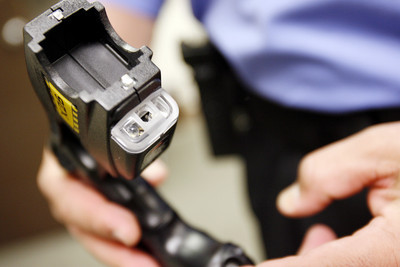Nationwide study claims Taser stun guns safe
Ever since the Taser stun gun became a fixture on police belts across the country several years ago, critics and supporters of the weapon have debated its safety.
A recent nationwide study, billed as the first independent large-scale look at the weapon, called the Taser overwhelmingly safe.
Most people shot with Tasers reported no injuries, and most injuries were minor puncture wounds from the Taser prongs, bruises or scrapes, researchers found.
"It's certainly a safe device to use to bring someone into compliance," said Dr. Joe Heck, a medical consultant with the Metropolitan Police Department who looked at more than 500 Taser shootings by Las Vegas police for the study.
But the study spearheaded by the Wake Forest University School of Medicine did little to quell critics who say the Taser is overused and has been linked to nearly 300 deaths.
"There's really no reason to have any confidence in any study that Tasers are safe," said Gary Peck, executive director of the American Civil Liberties Union of Nevada.
He noted the rising number of people who died after being shot with the Taser, including four in recent weeks.
"The bodies keep piling up," Peck said.
The Wake Forest study tracked nearly 1,000 Taser shootings at six police agencies across the country between July 2005 and June 2007.
Doctors reviewed any available medical records associated with each case and found no reported injuries in 77 percent of the cases and minor injuries in 23 percent of the cases.
Three significant injuries and two deaths were reported. Researchers said they were not directly related to the Taser, although some head injuries were caused by falls after being shot.
"The point we're trying to bring home is the Taser itself is not lethal, but the circumstances surrounding use of a Taser can result in death," said Heck, who provides medical support to the Las Vegas police SWAT team.
The findings of the study, which will continue through next year thanks to a grant by National Institute of Justice, support what Las Vegas police have found in the four years they have used the Taser, Assistant Sheriff Ray Flynn said.
The Police Department has seen a reduction in officer injuries, and the Taser has a high success rate in ending confrontations without the injuries that might have been seen with other officer weapons, such as batons or pepper spray, he said.
In fact, many suspects surrender at the mere sight of the Taser, he said.
"The bad guys know this thing is effective and don't want to be tased again," Flynn said.
The number of Taser incidents by Las Vegas police has fallen from 573 in 2004 to 454 last year. This year's number is projected to reach 445.
Flynn said he believes most Taser-related deaths are caused by underlying medical problems, not the stun gun's electric jolt.
He compared the outcry against the Taser to criticism of other police tools as they have been introduced.
"Critics are real quick to go to the tool," Flynn said. "First it was the baton. Then it was mace. Now it's the Taser."
Heck, a Republican state senator, said Taser critics rely on baseless allegations instead of medical facts to support their claims.
"There are those who have a set agenda who won't be swayed by science," he said.
But from the ACLU's point of view, any scientific study of the Taser must be questioned because the company has created a climate of intimidation by threatening to sue coroners who link the weapon to fatalities, Peck said.
And no strong conclusions can be made about the Wake Forest study because the authors have only released an abstract of their results, he said.
"No one study is conclusive," Peck said. "This study may be rife with problems."
Peck supports the use of Tasers but has called for stricter policies on their use. He said the guns should be used only in situations where the public or police are in danger, not as compliance tools.
Police also need policies to avoid shooting people with heart conditions or other medical problems that raise the risk of death in Taser shootings, he said.
Heck stands by the study and the results, saying it was done by medical professionals who sought only the truth.
If the study showed the Taser caused significant injuries, the authors would have noted it, he said.
Based on the study and his experience working with the SWAT team, Heck said the Taser is an invaluable police tool that is safe for officers and suspects.
"People want to say it's cruel and unusual punishment," Heck said. "It's not, compared to being shot."
Contact reporter Brian Haynes at bhaynes @reviewjournal.com or (702) 383-0281.

















